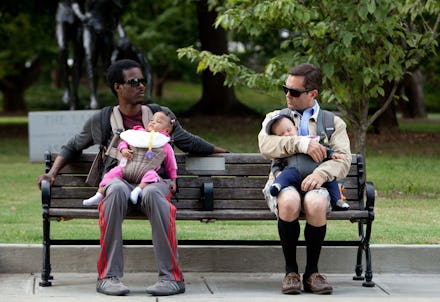One Striking Chart Reveals That Men, Too, Struggle To 'Have It All'

"Having it all" is no longer just a "women's issue."
According to a new report by the Council of Economic Advisors, titled Women's Participation in Education and the Workforce, when it comes to balancing career and family life the challenge of "having it all" is reaching gender parity.
In 2008, 60% of fathers admitted to having a career/family conflict compared to 47% of women. This marks a 71% increase since 1977, when the women's movement began making great strides in the labor force (but hit a stumbling block with the failure of the ERA in 1979).
This new statistic can be attributed to a confluence of factors, including the fact that women comprise nearly half of the labor workforce and men's "desires to be active caregivers and to share parenting with their partners," the report explains.
As a result, the report continues, "Men and women are increasingly pressed for time and, as a result, struggle to meet their work and family responsibilities."
The rise of men feeling the strain of "having it all" is no doubt reflect in the fact that they are placing more value, and spending more time, outside work. Indeed, another chart in the report shows that, compared to 1965 data, men are spending more time away from paid work — on average, 5.5 hours more a week — on family life matters, including childcare and housework.
More than ever before, men are experiencing the struggle of "having it all." But this gender parity when it comes to finding a balance between work and life suggests another reason for the struggle, because, the report contends, a greater percentage of both men and women feel the pressure: "In 2010, 46 percent of working men and women reported that their job demands interfered with their family life sometimes or often, up from 41 percent in 2002. In contrast, less than 30 percent reported that their family life interferes with their work life."
What the report implicitly points to is the macro-shift in the overall work-life balance of people of all genders who work in the 21st century. What I'll refer to as the Huffington-Jobs Effect, inspired by Arianna Huffington and Steve Jobs, respectively, people are working for paltry wages (or for free) and are simultaneously expected to be always connected/available 24/7 thanks to technology and being able to check our email from anywhere.
Of course, even as men struggle to balance their careers and their burgeoning family lives, the notion of 'having it all' is still one made belonging almost exclusively to women. For years, the not so subtly sexist notion — as well as onus — of "having it all" has been the responsibility of women. Women have been expected to not only have a career and have a family, but also look hot and stay in shape in order to convey that they do indeed "have it all."
"We feel we have to do everything," Barnard College President Debora Spar writes in her book Wonder Women: Sex, Power, and the Quest for Perfection.
Or, as Amy Poehler deftly said in an interview withThe Approval Matrix, "this feeling that...'I'm supposed to be all things'...is a feeling that women have every day and have their whole lives."
So, while the economy may be doing better than it has in years — Obama told a crowd in Providence, RI, this morning in a speech about women and the economy, growing at its fastest pace in 10 years and with an unemployment rate is under 6% for the first time in over half a decade — people are working harder and longer hours than ever. They are even "too afraid and too stressed" to take their hard earned vacation time because they are worried about falling behind at work.
While the CEA's report highlights the increasing gender parity when it comes to earning an income and taking care of the household, it also indicates that we are all tired and stressed as fuck.